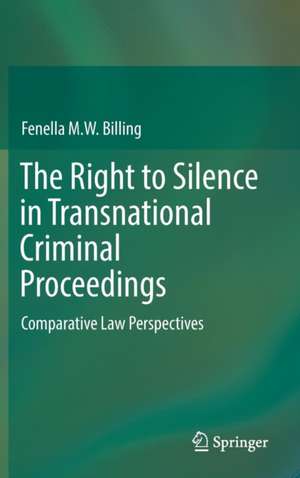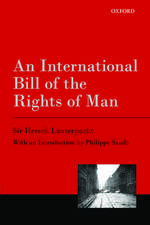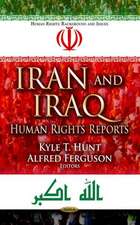The Right to Silence in Transnational Criminal Proceedings: Comparative Law Perspectives
Autor Fenella M. W. Billingen Limba Engleză Hardback – 9 sep 2016
This book considers the effectiveness and fairness of using international cooperation to obtain confession evidence or evidence of a suspect or accused person’s silence across borders. This is a question of balance in limiting and protecting the right to silence. The functioning of the applicable law in Denmark, England and Wales and Australia is analysed in relation to investigative and trial measures such as police questioning, administrative questioning powers, covert surveillance and the use of silence as evidence of guilt.
On the national level, this work examines the way in which domestic rules balance the right to silence in national criminal proceedings, and whether investigative and trial rules produce continuity throughout the criminal proceedings as a whole. From the transnational perspective, comparative legal analysis is used to determine whether the national continuity may be disrupted to such an extent that cooperation in the gathering of confession evidence causes unfairness. From the international perspective, this research compares the right to silence under the ICCPR and the ECHR to identify the overall effect of cooperating under particular human rights frameworks on the question of balance.
| Toate formatele și edițiile | Preț | Express |
|---|---|---|
| Paperback (1) | 894.46 lei 6-8 săpt. | |
| Springer International Publishing – 15 iun 2018 | 894.46 lei 6-8 săpt. | |
| Hardback (1) | 1009.54 lei 6-8 săpt. | |
| Springer International Publishing – 9 sep 2016 | 1009.54 lei 6-8 săpt. |
Preț: 1009.54 lei
Preț vechi: 1231.15 lei
-18% Nou
Puncte Express: 1514
Preț estimativ în valută:
193.20€ • 201.45$ • 160.57£
193.20€ • 201.45$ • 160.57£
Carte tipărită la comandă
Livrare economică 20 martie-03 aprilie
Preluare comenzi: 021 569.72.76
Specificații
ISBN-13: 9783319420332
ISBN-10: 331942033X
Pagini: 330
Ilustrații: XV, 372 p. 3 illus.
Dimensiuni: 155 x 235 x 22 mm
Greutate: 0.72 kg
Ediția:1st ed. 2016
Editura: Springer International Publishing
Colecția Springer
Locul publicării:Cham, Switzerland
ISBN-10: 331942033X
Pagini: 330
Ilustrații: XV, 372 p. 3 illus.
Dimensiuni: 155 x 235 x 22 mm
Greutate: 0.72 kg
Ediția:1st ed. 2016
Editura: Springer International Publishing
Colecția Springer
Locul publicării:Cham, Switzerland
Cuprins
Part I: The right to silence in context: Introduction.- Development of the right to silence in international human rights law.- Part II: National perspectives on the right to silence: The right to silence in Denmark.- The right to silence in England and Wales.- The right to silence in Australia.- Part III: Admissibility of confession evidence across borders: A transnational perspective.- Mutual trust and the right to silence in international cooperation.- Balancing the right to silence in transnational criminal cases.
Textul de pe ultima copertă
This book considers the effectiveness and fairness of using international cooperation to obtain confession evidence or evidence of a suspect or accused person’s silence across borders. This is a question of balance in limiting and protecting the right to silence. The functioning of the applicable law in Denmark, England and Wales and Australia is analysed in relation to investigative and trial measures such as police questioning, administrative questioning powers, covert surveillance and the use of silence as evidence of guilt.
On the national level, this work examines the way in which domestic rules balance the right to silence in national criminal proceedings, and whether investigative and trial rules produce continuity throughout the criminal proceedings as a whole. From the transnational perspective, comparative legal analysis is used to determine whether the national continuity may be disrupted to such an extent that cooperation in the gathering of confession evidence causes unfairness. From the international perspective, this research compares the right to silence under the ICCPR and the ECHR to identify the overall effect of cooperating under particular human rights frameworks on the question of balance.
Caracteristici
Presents a comprehensive analysis of the right to silence in several normative systems Highlights the challenges of admissibility of evidence in transnational criminal proceedings Challenges fundamental concepts in international cooperation, such as mutual trust














